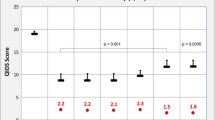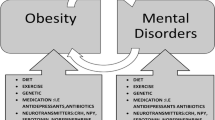Abstract
Using data from the 2004 to 2008 Medical Expenditure Panel Survey (MEPS), this study examined the relationship between obesity and the treatment of depression across racial/ethnic subgroups, controlling for depressive symptoms, self-rated mental health, health status, and socioeconomic characteristics. The association between obesity and depression-related medication was significant for white women but not for black or Hispanic women. Similarly, the association between obesity and depression-related ambulatory visits was significant for white women but not for black or Hispanic women. The results for men were, in general, mixed and inconsistent. The significant racial/ethnic differences found in the relationship between obesity and depression treatment among women suggest that social and cultural factors might play important roles in depression treatment among women.
Similar content being viewed by others
References
Flegal KM, Carroll MD, Ogden CL, et al. Prevalence and Trends in Obesity among US Adults, 1999-2008. Journal of the American Medical Association 2010; 303(3), 235-241.
Onyike CU, Crum RM, Lee HB, et al. Is obesity associated with major depression? Results from the Third National Health and Nutrition Examination Survey. American Journal of Epidemiology 2003; 158(12): 1139-1147.
Roberts RE, Kaplan GA, Shema SJ, et al. Are the obese at greater risk for depression? American Journal of Epidemiology 2000; 152(2): 163–170.
Dave DM, Tennant J, Colman G. Isolating the effect of major depression on obesity: Role of selection bias. The Journal of Mental Health Policy and Economics 2011; 14(4): 165-186.
Roberts RE, Deleger S, Strawbridge WJ, et al. Prospective association between obesity and depression: evidence from the Alameda County Study. International Journal of Obesity and Related Metabolic Disorder 2003; 27(4):514-521.
Schwartz TL, Nihalani N, Jindal S, et al. Psychiatric medication-induced obesity: a review. Obesity Reviews 2004; 5(2):115-121.
Patten SB, Williams JV, Lavorato DH, et al. Major depression, antidepressant medication and the risk of obesity. Psychotherapy Psychosomatics 2009; 78(3): 182-186.
Wang Y, Beydoun MA. The obesity epidemic in the United States—gender, age, socioeconomic, racial/ethnic, and geographic characteristics: a systematic review and meta-regression analysis. Epidemiologic Reviews 2007; 29(1): 6-28.
Kirby JB, Hudson J, Miller GE. Explaining racial and ethnic differences in antidepressant use among adolescents. Medical Care Research and Review 2009; 67(3): 342-363.
Zuvekas SH, Fleishman JA. Self-rated mental health and racial/ethnic disparities in mental health service use. Medical Care 2008; 46(9): 915–923.
Harris MB, Walters LC, Waschull S. Gender and ethnic differences in obesity-related behaviors and attitudes in a college sample. Journal of Applied Social Psychology 1991; 21 (19): 1545-1566.
Stevens J, Kumanyika SK, Keil JE. Attitudes toward body size and dieting: differences between elderly black and white women. American Journal of Public Health 1994; 84(8): 1322-1325.
Strauss RS, Pollack HA. Social marginalization of overweight children. Archives of Pediatric and Adolescent Medicine 2003; 157(8): 746-52.
Alegría M, Chatterji P, Wells K, et al. Disparity in depression treatment among racial and ethnic minority populations in the United States. Psychiatric Services 2008; 59(11):1264-1272.
Miranda J; Cooper LA. Disparities in care for depression among primary care patients. Journal of General Internal Medicine 2004; 19(2):120–126.
González HM; Croghan T; West B, et al. Antidepressant use in black and white populations in the United States. Psychiatric Services 2008; 59 (10):1131–1138.
Lagomasino IT, Dwight-Johnson M, Miranda J, et al. Disparities in depression treatment for Latinos and site of care. Psychiatric Services 2005; 56(12):1517–1523.
Melfi CA, Croghan TW, Hanna MP, et al. Racial variation in antidepressant treatment in a Medicaid population. Journal of Clinical Psychiatry 2000; 61 (1):16–21.
Cohen JW, Monheit AC, Beauregard KM,et al. The Medical Expenditure Panel Survey: A national health information resource. Inquiry 1996; 33(4): 373-389.
Cohen SB. Sample design of the 1996 Medical Expenditure Panel Survey Household Component. MEPS Methodology Report No. 2. Pub. No. 97-0027. Rockville, MD: Agency for Health Care Policy and Research, 1997.
Agency for Healthcare Research and Quality. PUF Documentation Files. MEPS HC-121. 2008 Full-Year Consolidated File. Rockville, MD: Agency for Healthcare Research and Quality, 2010. Available online at: http://www.meps.ahrq.gov/mepsweb/data_stats/download_data/pufs/h121/h121doc.pdf [cited May 30, 2012].
Expert Panel on the Identification, Evaluation, and Treatment of Overweight and Obesity in Adults. Executive Summary of the Clinical Guidelines on the Identification, Evaluation, and Treatment of Overweight and Obesity in Adults. Archives of Internal Medicine 1998; 158 (17):1855–67.
Kroenke K, Spitzer RL, Williams JB. The Patient Health Questionnaire-2: Validity of a two-item depressive screener. Medical Care 2003; 41(11):1284-1292.
Löwe B, Kroenke K, Gräfe K. Detecting and monitoring depression with a two-item questionnaire (PHQ-2). Journal of Psychosomatic Research 2005; 58(2): 163-71.
Centers for Disease Control and Prevention. County level estimates of obesity. Atlanta, GA. Centers for Disease Control and Prevention. Available online at http://apps.nccd.cdc.gov/DDT_STRS2/CountyPrevalenceData.aspx?mode=OBS. [cited 2012 March 15]
Ai C, Norton EC. Interaction terms in logit and probit models. Economics Letters 2003; 80 (1): 123-129.
Norton EC, Wang H, Ai C. Computing interaction effects and standard errors in logit and probit models. The Stata Journal 2004; 4(2):154-167.
Plant EA, Sachs-Ericsson N. Racial and ethnic differences in depression: the roles of social support and meeting basic needs. Journal of Consulting and Clinical Psychology 2004; 72(1):41-52.
Rowland ML. Self-reported Weight and Height. American Journal of Clinical Nutrition 1990; 52(6):1125-33.
Villanueva EV. The validity of self-reported weight in us adults: a population based cross-sectional study. BMC Public Health 2001; 1:11. Published online 6 November 2001.
Cawley J. The Impact of Obesity on Wages. Journal of Human Resources 200;439(2): 451-474.
Simon GE, Von Korff M, Saunders K, et al. Association between obesity and psychiatric disorders in the US adult population. Archives of General Psychiatry 2006; 63 (7): 824-30.
Conflict of interest
The authors declared no conflicts of interest with respect to the authorship and/or publication of this article.
Disclaimer
The authors appreciate the helpful comments of Barbara Schone, Thomas Selden, and Lan Liang. The views expressed in this paper are those of the authors, and no official endorsement by the Department of Health and Human Services, the Agency for Healthcare Research and Quality, or Social and Scientific Systems is intended or should be inferred.
Author information
Authors and Affiliations
Corresponding author
Rights and permissions
About this article
Cite this article
Abdus, S., Zuvekas, S.H. Racial/Ethnic Differences in the Relationship between Obesity and Depression Treatment. J Behav Health Serv Res 42, 486–503 (2015). https://doi.org/10.1007/s11414-014-9391-1
Published:
Issue Date:
DOI: https://doi.org/10.1007/s11414-014-9391-1




